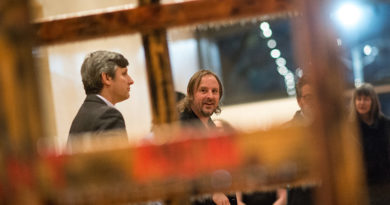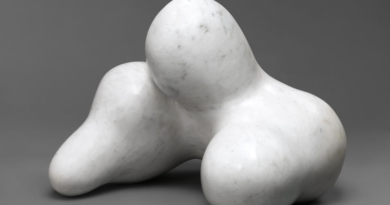Nasher Sculpture Center Announces 2018 Exhibitions
 The Nasher Sculpture Center announced its 2018 exhibitions. They will focus on the work of leading contemporary artists working in a wide array of media and methods, as well as an exhibition that considers the aesthetic qualities of some of the earliest man-made objects, handaxes.
The Nasher Sculpture Center announced its 2018 exhibitions. They will focus on the work of leading contemporary artists working in a wide array of media and methods, as well as an exhibition that considers the aesthetic qualities of some of the earliest man-made objects, handaxes.
Tom Sachs: Tea Ceremony
September 16, 2017 – January 7, 2018
Organized by the Noguchi Museum, the exhibition centers on an immersive environment representing Sachs’ distinctive reworking of chanoyu, or traditional Japanese tea ceremony—including the myriad elements essential to that intensely ritualistic universe. Sachs has also produced a complete alternative material culture of Tea—from bowls and ladles, scroll paintings and vases, to a motorized tea whisk, a shot clock, and an electronic brazier. During the course of the exhibition, the Nasher will present a series of public demonstrations in which Sachs or a colleague will perform tea ceremony for a few guests. The walls of the tea house will be removed for the occasion, enabling visitors to watch the ceremony as it unfolds.
Supplementing the tea garden are additional installations covering consummate examples of Sachs’ Tea tools, a brief history of Tea as it developed out of Sachs’ Space Program 2.0: MARS, and a selection of objects from the artist’s two decade–long career as a cultural hybridizer and devotee of modernist essentialism.
Tom Sachs: Tea Ceremony is accompanied by a 280-page artist’s book, Tea Ceremony Manual, documenting the artist’s culture and practice of Tea. Produced for the exhibition and published by The Noguchi Museum, with additional support from Yerba Buena Center for the Arts and Nasher Sculpture Center.
Paper into Sculpture
October 14, 2017 – February 4, 2018
Even as the shift to digitized images, virtual reality, and social media has been said to herald its obsolescence, paper nonetheless remains inescapable in our daily lives. Accessible to all, paper endures as the site of notes, lists, price tags, reminders, sketches, ads—at once the most mundane and the most intimate of communication media, and the most readily discarded. As concerns about humanity’s impact on the environment intensify, paper is also one of the most persistent reminders of our connections to nature through the cyclical nature of its creation, disposal, and regeneration through recycling. Derived largely from plant fibers, paper also ages and degrades, its fragility inspiring metaphorical associations with human corporeality and vulnerability. The artists inPaper into Sculpture—Noriko Ambe, Marco Maggi, Joshua Neustein, Nancy Rubins, and Franz West—play on tensions between commonly held understandings of sculpture and what paper can and cannot do, pushed to its physical limits. Treating paper as a material with a palpable three-dimensional presence rather than as a mere support for mark-making, they use processes ranging from tearing, crumpling, and cutting to scattering, binding, and adhering to create sculptural works that take a variety of forms, with a diverse range of expressive and conceptual implications.
First Sculpture: Handaxe to Figure Stone
January 27 – April 29, 2018
First Sculpture: Handaxe to Figure Stone is the first museum exhibition to present ancient handaxes and figure stones as works of art. Traditionally understood as the longest-used tool in human history, the handaxe is equally fascinating for its non-utilitarian, aesthetic qualities. First Sculpture will present these objects as evidence of the earliest forms of artistic intention, highlighting the aesthetic qualities of each stone and providing crucial historical and scientific information to give the viewer a deeper understanding of human history, as well as an enriched appreciation for humankind’s early ability to sculpt beautiful objects. Whether carved from visually interesting stones or rendered at unusual sizes that would inhibit use of the object as a tool, a case can be made for the handaxe as the first sculpture our prehistoric ancestors conceived. First Sculpture: Handaxe to Figure Stone is the product of a unique curatorial collaboration between Los Angeles-based artist Tony Berlant and anthropologist Dr. Thomas Wynn, Distinguished Professor at the University of Colorado, Colorado Springs. The exhibition will be accompanied by an illustrated, scholarly catalogue published by the Nasher, with a central essay co-written by exhibition curators Berlant and Wynn, as well as a preface by renowned American scientist, Jared Diamond.
Sightings: Nairy Baghramian
March 10 – July 8, 2018
The sculptural installations of Nairy Baghramian draw upon the frequently divergent histories of art, architecture, and design, as well as dance, theater, and photography. The space of a gallery may be reconceived as the interior of a body or its internal architecture turned inside out, with Baghramian’s objects—fashioned from cast aluminum, resin, beeswax, and other materials—bolted into place or leaned against walls, calling into question commonplace distinctions between interior and exterior, meaning and form, art object and site. For the Nasher exhibition, Baghramian will create new work as part of the museum’s on-going Sightings series of installations and interventions. Born in 1971 in Isfahan, Iran, Baghramian lives and works in Berlin.
Sterling Ruby: Sculpture
May 5 – August 19, 2018
Sterling Ruby’s multifaceted practice encompasses painting, collage, photography and video, textiles, clothing, ceramics, sculpture, and installations. Featuring 20–30 large- and moderately-scaled sculptures spanning his career, Sterling Ruby: Sculpture will be the first museum exhibition to survey his sculptural work and the great variety of methods and materials he has explored. From poured polyurethane works to monumental ceramic collages weighing hundreds of pounds to soft sculptures incorporating inexpensive fabrics that the artist often dies himself, to Minimalist compositions of urethane and Formica, Ruby’s works cross traditional divisions between media and ignore the line between high and low, fine art and craft, luxury goods and common necessities. Incorporating a range of modernist strategies to make expressive works of art with materials typically associated with utility and affordability, Ruby’s work addresses a range of issues—from societal to personal—and re-examines notions of beauty and value. Organized by the Nasher Sculpture Center, Sterling Ruby: Sculpture will be accompanied by a lavishly illustrated catalogue featuring an essay on Ruby’s work by Nasher Chief Curator, and curator of the exhibition, Jed Morse.






